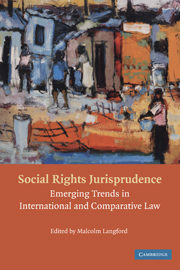Book contents
- Frontmatter
- Contents
- Foreword – Philip Alston
- Preface
- PART ONE OVERVIEW
- PART TWO SELECT NATIONAL JURISDICTIONS
- PART THREE REGIONAL PROCEDURES AND JURISPRUDENCE
- PART FOUR INTERNATIONAL HUMAN RIGHTS PROCEDURES AND JURISPRUDENCE
- 23 Committee on Economic, Social and Cultural Rights
- 24 Committee on the Elimination of Racial Discrimination
- 25 Human Rights Committee
- 26 Committee on the Elimination of Discrimination Against Women
- 27 Committee on the Rights of the Child
- PART FIVE SPECIAL TOPICS
- Notes on Contributors
- Table of Authorities
- Index
- References
24 - Committee on the Elimination of Racial Discrimination
Confronting Racial Discrimination and Inequality in the Enjoyment of Economic, Social and Cultural Rights
Published online by Cambridge University Press: 05 June 2012
- Frontmatter
- Contents
- Foreword – Philip Alston
- Preface
- PART ONE OVERVIEW
- PART TWO SELECT NATIONAL JURISDICTIONS
- PART THREE REGIONAL PROCEDURES AND JURISPRUDENCE
- PART FOUR INTERNATIONAL HUMAN RIGHTS PROCEDURES AND JURISPRUDENCE
- 23 Committee on Economic, Social and Cultural Rights
- 24 Committee on the Elimination of Racial Discrimination
- 25 Human Rights Committee
- 26 Committee on the Elimination of Discrimination Against Women
- 27 Committee on the Rights of the Child
- PART FIVE SPECIAL TOPICS
- Notes on Contributors
- Table of Authorities
- Index
- References
Summary
INTRODUCTION
The Committee on the Elimination of Racial Discrimination (‘CERD’ or ‘the Committee’), a body of eighteen independent experts, monitors the implementation of the International Convention on the Elimination of All Forms Racial Discrimination (‘the Convention’) by States parties. Article 9 of the Convention provides for a system of reporting, which requires the submission of an initial report within one year after the entry into force of the Convention for the State concerned and thereafter every two years. The second compliance mechanism is an optional system of individual and group complaints provided for in Article 14 of the Convention. Bearing in mind the number of States that do not comply regularly with their reporting obligations, the Committee has also introduced a so-called review procedure through which it reviews the implementation of the Convention without a report by States that are at least five years late in the submission of their reports. Additionally, the Committee adopted in 1993 a working paper providing for early warning and urgent action procedures.
The Committee views the ‘Convention, as a living instrument, [to] be interpreted and applied taking into account the circumstances of contemporary society’. The general approach of the Committee to the interpretation of the Convention has been increasingly creative, as can be seen through the thirty-one General Recommendations which it has adopted between 1972 and 2005.
- Type
- Chapter
- Information
- Social Rights JurisprudenceEmerging Trends in International and Comparative Law, pp. 517 - 539Publisher: Cambridge University PressPrint publication year: 2009



